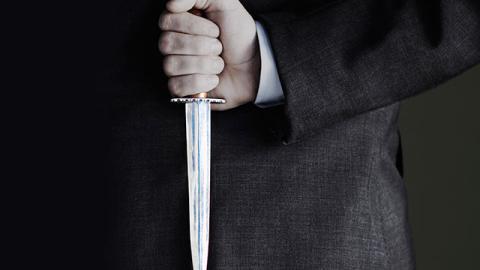
Why Does Evil Exist in the World?
Humanity has been looking into this question forever, but we never get satisfying answers. Wisdom is to be very humble. We don't know too much. But perhaps it does not matter. What I can say, and what you can say, is that evil exists. Let us begin by looking at the world around us.
I was visiting Honduras once, and a woman in our community there pointed out a house on a hillside. "It is the drug dealer's house," she said, "A gang seduces the young people by giving them drugs, by bringing them to the point of addiction. This drug-dealer is protected by the police, and the police are under the protection of the government." Looking at the house from the bottom of the hillside, it was easy to see what was happening. It was the death of youth, the enslavement of innocence, the destruction of those in whom there is every hope of growth to truth and love. Would you agree that this is evil?
Evil is the destruction or stamping out of life that is so repulsive that we want to run for protection before confronting it. Yet its curious power is that when we shield our eyes, cover our ears, and keep silent, we participate in it.
To collude with evil is to refuse to love and to resist the movement of life. When we begin to look, we may be astonished to find how prevalent this is and how unconsciously it occurs. We so easily get caught up in a desire to win, a desire to be the best, and a desire to succeed that we are willing to crush others. We become so focused upon a single goal that we lose sight of the primacy of truth and love. In a culture of normality defined by competition, mistrust, and greed, everybody loses.
What do you think? Are humans fundamentally sinful? What does that even mean?
My thought is that we are all broken people and that there is a tension within all of us. It manifests in moments when I am not really listening to someone, moments when I want to do my thing and not take time to be grateful for everything given, when I am not really listening to my conscience. Original or not so original, this struggle is within each of us. The important thing is to grow, to grow to greater love, to greater truthfulness, and to the audacity that witnesses to truth. The important thing is to heal those places of brokenness within each of us, to over- come the places of division, and to work through the barriers and the layers of protection.
So we cannot say where evil came from or why there is evil in the world. The important thing is to be aware that some kind of evil spirit does seem to exist. I don't mean that there is a devilish-looking fellow creeping about, ready to spring from under the stairs. I am talking about a way of being, about an evil that we all too easily become part of. It is all too easy to plant seeds of hatred, greed, and judgment. It happens quite unconsciously! When we are repulsed by evil to the point that we must turn away and pretend we never saw anything, we allow a division to form within us. How subtly evil works! In protecting ourselves, in turning away, in failing to witness to life, we become complicit.
What does that mean in more everyday terms? It means that rather than seeking to destroy our enemies, rather than seeking to eliminate terrorists or shun multinational corporations, rather than fighting bullies or jailing delinquents, rather than judging Lazarus or blaming the rich man, we can pray that the light of goodness that exists in every human person may rise up.
Sometimes I read the news and I feel powerless. There are hundreds of people leaving home to join the radical militant groups every week. What can we even do in the face of such situations? How can peace ever be achieved? It is not clear what our role is in a conflict that in many ways is over and above us.
I was at a conference on the topic of seeing the goodness in each person and someone posed the question, "What about those jihadists, cutting off people's heads and everything?" The keynote speaker, Lytta Basset, looked at the group—primarily earnest Catholics—and asked, "Who here prays for the jihadists?" Not a single hand went up. Even in the face of such a feeling of powerlessness, we can do something. We can pray.
Praying implies that we take a moment to hold places of overwhelming conflict and injustice, to be there in spirit with the people whose names and faces we do not know but who are part of our one human family. Praying means that we create a special place in our hearts for those who are invaded by violence and cruelty, who are victims of deep fears and anguish. Praying means that even in our inability to take action, we prepare our hearts to welcome that little light of goodness and life that cannot be overcome, even in people who are violent. Praying means transforming our own hearts. It means asking Jesus for the strength and wisdom to love the way that he does—open and fearless.
This is what it means to grow in our humanity. It means to grow in our capacity to forgive and welcome those who seem so far from us, so difficult to love. This is essential to overcoming divisions. It is by simple reverence and forgiving growth in love that evil is overcome.
Excerpted from Life's Great Questions by Jean Vanier. © 2015 by Jean Vanier. Published by Franciscan Media. All rights reserved.




